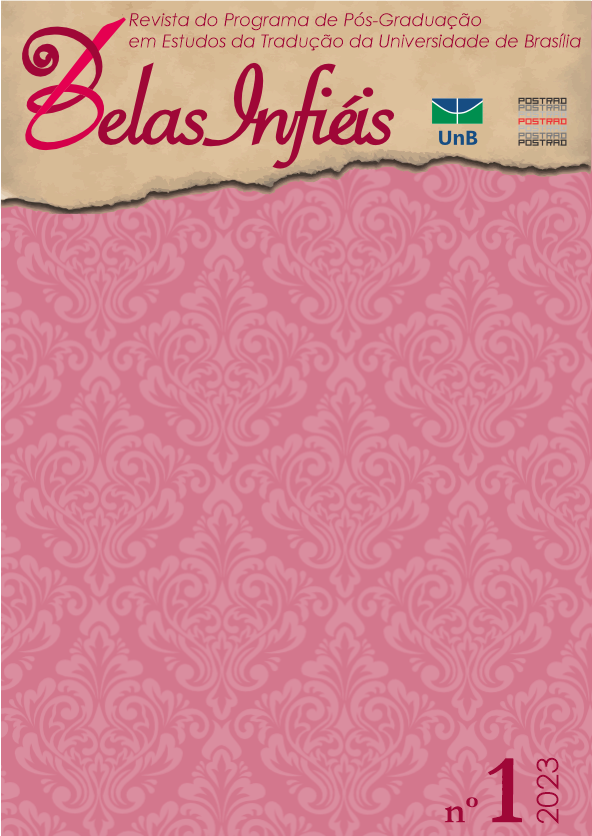“Preparando o terreno”: palavras introdutórias dos tradutores à tradução do texto de Don Kiraly (2012), Cultivando uma pedagogia da tradução baseada em projetos: uma perspectiva fractal
DOI:
https://doi.org/10.26512/belasinfieis.v12.n1.2023.46755Palavras-chave:
Don Kiraly. Pedagogia da Tradução. Artigo traduzido.Resumo
Este artigo traça um caminho fractal através da psicologia e filosofia educacionais, numa tentativa de elucidar uma perspectiva arborescente de fontes de inspiração complementares e interdisciplinares para uma pedagogia da tradução baseada em projetos. A partir de uma abordagem socioconstrutivista baseada em projetos proposta na virada do milênio, tenta-se desenhar um quadro mais amplo das influências sinérgicas subjacentes a uma abordagem “holística-experiencial” emergente da formação de tradutores. O pós-modernismo, a ciência cognitivo-enatista, a teoria da complexidade, a teoria educacional transformacional e a epistemologia socioconstrutivista são algumas das raízes complementares que podem ser vistas como fontes potenciais de inspiração para o cultivo de uma abordagem centrada na aprendizagem para o desenvolvimento da expertise do tradutor em ambientes institucionais.
Downloads
Referências
Bereiter, C., & Scardamaglia, M. (1993). Surpassing Ourselves. Open Court.
Bruffee, K. (1995). Collaborative Learning. Johns Hopkins University Press.
Bruner, J. (1960). The Process of Education. Harvard University Press.
Davis, B. (2004). Inventions of Teaching: A Geneology. Lawrence Earlbaum Associates.
Davis, B., Sumara, D., & Luce-Kapler, R. (2000). Engaging Minds: Learning and Teaching in a Complex World. Lawrence Earlbaum Associates.
Dewey, J. (1938). Experience and Education. Simon and Schuster.
Duffy, T. M. (2009). Building lines of communication and a research agenda. In S. Tobias, & T. Duffy (Orgs.), Constructivist Instruction: Success or Failure (pp. 351–367). Routledge.
Echeverri, A. (2008). Énième plaidoyer pour l’innovation dans les cours pratiques de traduction. Préalables à l’innovation? TTR, 21(1), 65–91.
Fenwick, T., & Tennent, M. (2004). Understanding Adult Learners. In G. Foley (Org.), Dimensions of Adult Learning (pp. 55–73). Allen & Unwin.
Hurtado Albir, A. (2008). Compétence en traduction et formation par compétences. TTR, 21(1), 17–64.
Kiraly, D. (1995). Pathways to Translation. Kent State University Press.
Kiraly, D. (2000). A Social Constructivist Approach to Translator Education. St. Jerome.
Kiraly, D. (2005). Towards Postmodern Translator Education: from Transmission through Construction to Emergence. Meta, 50(4), 1098–1111.
Kiraly, D. (2006a). Beyond social constructivism: complexity theory and translator education. Translation and Interpreting Studies, 6(1), 68–86.
Kiraly, D. (2006b). Sprachmittlung in einer komplexen Welt: Die Übersetzerausbildung im Wandel. In G. Wotjak (Org.), Quo vadis Translatologie? Ein halbes Jahrhundert universitäre Ausbildung von Dolmetschern und, eds. Übersetzern in Leipzig. Rückschau, Zwischenbilanz und Perspektiven aus der Außensicht (pp. 191–204). Frank und Timme.
Kiraly, D. (2008). Transcultural relating: An example of project-oriented translator education. Studia Universitatis Babes-Bolyai – Philologia, 3, 5–10.
Kiraly, D. (2009). Acknowledging learning as enaction: moving beyond social constructivism towards empowerment in translator education. In C. Laplace, M. Lederer, & D. Gile (Eds.), La Traduction et ses métiers (pp. 179–191). Caen: Lettres Modernes Minard.
Kiraly, D. (2010). Emergence in the language classroom: An experiment in facilitated language acquisition. In H. Lee-Jahnke, & E. Prunč (Orgs.), Am Schnittpunkt von Philologie und Translationswissenschaft, Festschrift zu Ehren von Martin Forstner (pp. 109–119). Peter Lang.
Lakoff, G., & Johnson, M. (1980). Metaphors We Live By. University of Chicago Press.
Maturana, H. R., & Varela, F. (1992). The Tree of Knowledge. Shambhala.
Prechter, R. (2004). The fractal nature of the stock market: the human social experience forms a fractal. In N. Lesmoir-Gordon (Org.), The Colours of Infinity: The Beauty, Power and Sense of Fractals (pp. 128–139). Clear Press.
Risku, H. (1998). Translatorische Kompetenz: Kognitive Grundlagen des Übersetzens als Expertentätigkeit. Studien zur Translation, 5. Tübingen: Stauffenburg.
Schon, D. (1987). Educating the Reflective Practitioner. Jossey-Bass.
Tudor, I. (1992). Learner-centredness in language teaching: finding the right balance. System, 20(1), 31–44.
Wood, D., Bruner, J., & Ross, G. (1976). The role of tutoring in problem solving. Journal of Child Psychology and Psychiatry, 17(2), 89–100.
Vygotsky, L. (1994). Extracts from Thought and Language and Mind in Society. In B. Stierer, & J. Maybin (Orgs.), Language, Literacy and Learning in Educational Practice (pp. 45–58). Multilingual Matters.
Downloads
Publicado
Como Citar
Edição
Seção
Licença
Copyright (c) 2023 CC BY

Este trabalho está licenciado sob uma licença Creative Commons Attribution 4.0 International License.
Dado ao acesso público desta revista, os textos são de uso gratuito, com obrigatoriedade de reconhecimento da autoria original e da publicação inicial nesta revista
A revista permitirá o uso dos trabalhos publicados para fins não comerciais, incluindo direito de enviar o trabalho para bases de dados de acesso público. As contribuições publicadas são de total e exclusiva responsabilidade dos autores.
Os autores, ao submeterem trabalhos para serem avaliados pela revista Belas Infiéis, mantêm os direitos autorais e concedem à revista o direito de primeira publicação, sendo o trabalho licenciado sob a Creative Commons Attribution License Atribuição 4.0 Internacional (CC BY 4.0).



















